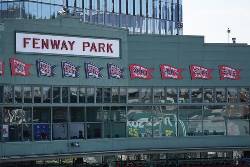For the first time in nearly 70 years, boxing is returning to Boston’s famed Fenway Park.
The 11-fight card is the culmination of years of effort by twin brothers and longtime public schoolteachers who grew up in Watertown and want to revitalize boxing in the city that was home to some of the greatest athletes in the sport’s history.
It’s also symbolic of a shift back to the roots of the oldest ballpark in Major League Baseball, to when it wasn’t just used for Red Sox games but for other sports and political events.
“Most people’s experience there is solely related to baseball,” said Richard Johnson, Fenway expert and curator at The Sports Museum in Boston. “But the fact is that this year, you can see an event that’ll be very similar to what your grandparents saw.”
Promoters Mark and Matt Nolan want “Fight Night at Fenway,” scheduled for Saturday, to be both a time capsule and time machine, taking spectators back to boxing’s glory days and what the sport can be for the city in the future.
The Nolans got their license to organize fights last year with the goal of bringing boxing back to Boston. After Fenway, “That’s mission accomplished,” Matt Nolan said.
“It’s not just like our dream, it’s everybody’s dream — every boxer on planet Earth,” he said. “Just the idea that some kid can fight his way to Fenway Park. It’s like hitting the lottery. You can’t you can’t beat it. There’s nothing comparable.”
A rich history
Boston has played a long and impressive role in American boxing history and the development of the sport itself, said Johnson, author of “Field of Our Fathers, An Illustrated History of Fenway Park.”
The city was home to “Boston’s Strong Boy,” John L. Sullivan, born in 1858 to Irish immigrant parents and widely considered America’s first sports superstar. The first heavyweight champion of the world, he was as famous as Muhammad Ali was in his time.
Sam Langford, a Black Canadian-born boxer, moved to Boston as a teenager but was blocked from competing in the world championships by racist policies and is considered one of the greatest non-champions in boxing.
Other boxing stars with Boston connections include Marvin Hagler and Rocky Marciano of nearby Brockton. ”The Boston Bomber” Tony DeMarco, whose statue raises his fists at passersby in Boston’s North End, was the last fighter to win in the ring at Fenway in 1956.
For a time after it was built, Fenway Park was the only outdoor venue with a significant seating capacity in Boston, making it a destination for all kinds of events, including boxing starting in 1920.
After new owners took over in 2002, the park became a venue for a variety of activities, including concerts and sporting events such as hockey, snowboarding, Irish football and curling.
“Back in the day, it was sort of the Swiss Army knife of sports facilities in Boston. And it’s returned to that — a little bit of everything. So, returning boxing to the park is just a nod to the past,” Johnson said.
Other venues can feel “more corporate and sterile,” but Fenway is living history, said Johnson, who calls it the “largest open-air museum in New England.”
A different pitch
Mark Nolan said it’s not for lack of trying that no one has hosted a boxing fight at Fenway in almost 70 years. But many promoters couldn’t make a pitch that landed with ballpark management.
The Nolans, who teach full time and own a boxing gym in Waltham where people can train regardless of their ability to pay, were different. After success hosting events at other venues, Mark Nolan said Fenway Sports Group connected to their “everyman” appeal and decided to give them a shot.
The brothers fell in love with boxing while accompanying their father, a boat captain, to the gym as kids.
When they expanded from coaching amateur boxers to professionals five years ago, they were dismayed by what they found: shows full of uneven fights set up to make the promoters as much money as possible, with established amateurs fighting people who “have no right putting gloves on in any capacity whatsoever” in venues like high school gymnasiums. Fighters weren’t being paid fairly and contracts weren’t transparent.
They came up with a simple business plan: pick good venues, pay fighters well and only host matches in Boston proper. They said a lot of promoters sell fighters, but they’re focused on selling fights fans want to see.
“They’re making sure that every fight is well-matched,” said Thomas “The Kid” O’Toole, a fighter from rural Galway, Ireland, who has lived in Boston for the past two years, “Nobody wants to see someone go in and just knock their opponent out right away and beat them up for four, six, eight rounds. They want to see a competitive fight.”
O’Toole went professional in 2021 and is undefeated with 13 fights. He said his fight against St. Louis-born Vaughn “Da Animal” Alexander at Fenway will be “the biggest test of his career.”
Massachusetts-born Lexi “Lil Savage” Bolduc will compete in her fourth professional fight. She faces Sarah Couillard in a rematch after coming out on the losing end of a majority draw at the Royale.
“Fighting at Fenway, I think adds a little bit of pressure because I’m local, I grew up in Mass and idolized a lot of players as I was growing up. ... But at the same time, I’m trying to use it just as a huge opportunity and really soak in the moment,” she said. “Pressure makes diamonds.
“To be able to kind of stand on that same ground of some of the most accomplished athletes, it’s really remarkable,” she said.
...


 Copyright © 1996 - 2025 CoreComm Internet Services, Inc. All Rights Reserved. | View our
Copyright © 1996 - 2025 CoreComm Internet Services, Inc. All Rights Reserved. | View our